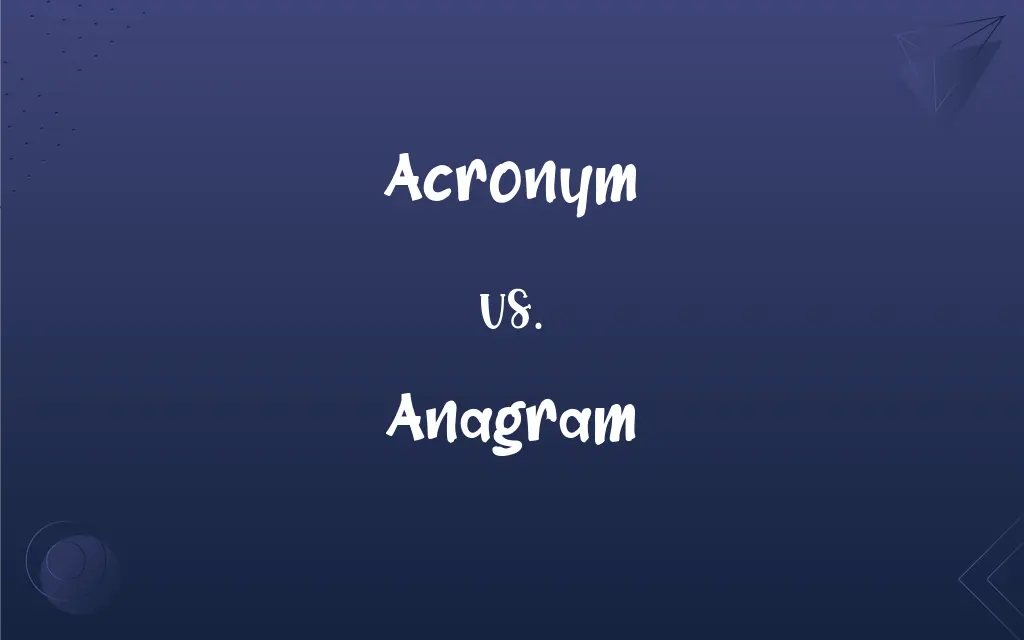Acronym vs. Anagram: What's the Difference?
Edited by Harlon Moss || By Janet White || Updated on October 18, 2023
An "acronym" is an abbreviation formed from initial letters pronounced as a word; an "anagram" is a word formed by rearranging letters of another.

Key Differences
An "acronym" is a pronounceable word formed from the first letter (or first few letters) of each word in a phrase or title, often serving as an abbreviated form of that phrase or title, making complex terms or phrases easier and faster to read and write; "anagram," however, refers to a form of word play in which letters of a word or phrase are rearranged in such a way that a new word or phrase is formed, usually using all the original letters exactly once, serving often as a puzzle or form of entertainment.
The primary purpose of an "acronym" is to simplify written and spoken communication, particularly when the original phrase is long and used frequently; "anagrams," on the other hand, are primarily used for entertainment, cognitive exercises, or pseudonyms, not for simplification in communication.
"Acronym" is used in both informal and formal language, creating a shorthand that, once understood, can be quickly recognized and interpreted by those familiar with the original term; "anagram" requires a decoding process, where the receiver must often rearrange the letters mentally or visually to understand the intended word or phrase, which makes it more recreational than practical.
Popular "acronyms" often become words in their own right and can be found in the dictionary as standalone entries, losing their association with the original terms over time; "anagrams," however, typically remain tied to their source words, as the relationship between the source and the result is where their meaning and humor lie.
In professional or technical fields, "acronyms" serve as an essential jargon, allowing specialists to communicate complex concepts efficiently; "anagrams" are seldom used in these contexts, being more associated with literature, puzzles, and leisure activities.
ADVERTISEMENT
Comparison Chart
Purpose
Simplification in communication
Entertainment, word play
Usage
Formal and informal language
Recreational, literary
Recognition
Standalone recognition over time
Tied to original word
Fields of Application
Professional, technical
Literature, puzzles
Formation
Initial letters of words
Rearrangement of all letters of a word
ADVERTISEMENT
Acronym and Anagram Definitions
Acronym
A word composed of the first letters or groups of letters of words in a set phrase or series of words.
PIN stands for Personal Identification Number and is an acronym.
Anagram
A word or phrase formed by rearranging the letters of a different word or phrase.
The word 'silent' is an anagram of 'listen.'
Acronym
A short form of a phrase made by taking the initial letters of the words.
OPEC is an acronym for Organization of the Petroleum Exporting Countries.
Anagram
A word play that forms new words or phrases by rearranging the letters of another.
The word 'evil' is an anagram of 'vile.'
Acronym
A word from the initial letters of each word in a set of words.
SCUBA is an acronym for Self-Contained Underwater Breathing Apparatus.
Anagram
A word or phrase made by using the letters of another word or phrase in a different order.
'Schoolmaster' is an anagram of 'the classroom.'
Acronym
An abbreviation that forms a word from the initial components in a phrase.
RADAR is an acronym for Radio Detecting and Ranging.
Anagram
A game or puzzle creating a new word or phrase from the letters of another word.
'Dormitory' turns into 'dirty room' when its letters are rearranged as an anagram.
Acronym
An abbreviation formed from the initial letters of other words and pronounced as a word.
NASA is an acronym for the National Aeronautics and Space Administration.
Anagram
A rearrangement of the letters in a word to form another word or phrase.
'Astronomer' can be rearranged into 'moon starer' as an anagram.
Acronym
A word formed by combining the initial letters of a multipart name, such as NATO from North Atlantic Treaty Organization or by combining the initial letters or parts of a series of words, such as radar from radio detecting and ranging.
Anagram
A word or phrase formed by reordering the letters of another word or phrase, such as satin to stain.
Acronym
Usage Problem An initialism.
Anagram
Anagrams (used with a sing. verb) A game in which players form words from a group of randomly picked letters.
Acronym
(linguistics) An abbreviation formed by the initial letters of other words, sometimes exclusively such abbreviations when pronounced as a word (as "laser") rather than as individual letters (initialisms such as "TNT").
Anagram
(of words) A word or phrase that is created by rearranging the letters of another word or phrase.
Acronym
(linguistics) An abbreviation formed by the beginning letters or syllables of other words (as "Benelux").
Anagram
To form anagrams.
Acronym
To form into an acronym.
Anagram
Literally, the letters of a word read backwards, but in its usual wider sense, the change of one word or phrase into another by the transposition of its letters. Thus Galenus becomes angelus; William Noy (attorney-general to Charles I., and a laborious man) may be turned into I moyl in law.
Acronym
A word formed from the initial letters of a multi-word name
Anagram
To anagrammatize.
Some of these anagramed his name, Benlowes, into Benevolus.
Anagram
A word or phrase spelled by rearranging the letters of another word or phrase
Anagram
Read letters out of order to discover a hidden meaning
FAQs
Can an acronym be more than one word?
Typically, acronyms are single words formed from initial letters of a phrase.
Can anagrams form multiple words?
Yes, they can form words or phrases.
Do anagrams have to use all letters from the original word?
Yes, anagrams use all the original letters exactly once.
Are acronyms always pronounced as words?
Most are, but some are spelled out, like "FBI."
Do all industries use acronyms?
Acronyms are prevalent in many fields, especially technical ones.
Are acronyms used in everyday speech?
Yes, common ones like "ASAP" are widely used.
Do anagrams exist in languages other than English?
Yes, anagrams are a global form of word play.
Can an acronym include numbers?
Rarely. They're mostly formed from letters.
Is creating anagrams a mental skill?
Yes, it involves linguistic intelligence and creativity.
Are anagrams always related to the original word's meaning?
No, anagrams often form words or phrases unrelated to the original.
Can an acronym become a standard word?
Yes, some acronyms enter everyday language as words.
Are there anagram games?
Yes, there are games and puzzles based on anagrams.
Can acronyms be confusing?
Without context, they can be.
Can anagrams be unintentional?
Usually, they're intentional, but coincidental ones can occur.
Do acronyms have a grammatical function?
They function as nouns in sentences.
Do anagrams have a specific structure?
No, any word or phrase can be an anagram of another.
Is there a rule on forming acronyms?
Generally, they're made from the first letter of each key word.
Are anagrams considered a type of riddle?
Often, as they require rearranging letters to find meaning.
Are anagrams used in literature?
Yes, they're a common literary device.
Are all acronyms capitalized?
Often, but not always, especially if they become regular words.
About Author
Written by
Janet WhiteJanet White has been an esteemed writer and blogger for Difference Wiki. Holding a Master's degree in Science and Medical Journalism from the prestigious Boston University, she has consistently demonstrated her expertise and passion for her field. When she's not immersed in her work, Janet relishes her time exercising, delving into a good book, and cherishing moments with friends and family.
Edited by
Harlon MossHarlon is a seasoned quality moderator and accomplished content writer for Difference Wiki. An alumnus of the prestigious University of California, he earned his degree in Computer Science. Leveraging his academic background, Harlon brings a meticulous and informed perspective to his work, ensuring content accuracy and excellence.
































































